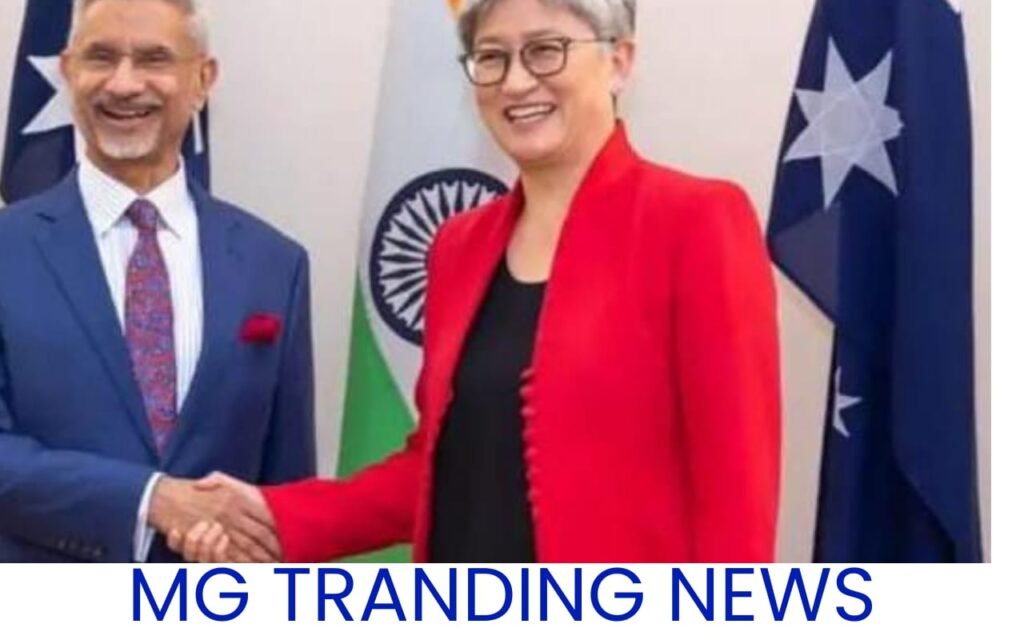
Outline
- Introduction
- Historical Context of India-Canada Relations
- Recent Developments Intensifying Tensions
- 3.1 Justin Trudeau’s Role and Statements
- 3.2 Impact on Diplomatic Relations
- S. Jaishankar’s Statement: Key Points
- 4.1 Background of Jaishankar’s Statement
- 4.2 The Message from India’s Foreign Minister
- Canada’s Reaction to Jaishankar’s Statement
- 5.1 Details of the Ban on Australia Today
- 5.2 Controversy Surrounding Canada’s Action
- Australia Today’s Role in the Scenario
- 6.1 Coverage of Jaishankar’s Statements
- 6.2 Canada’s Response to the Media Outlet
- Global Reactions to Canada’s Move
- 7.1 Australia Today’s Response
- 7.2 Reactions from the International Community
- Freedom of Press vs. Government Censorship
- 8.1 Debate Over Media Freedom
- 8.2 Canada’s Previous Actions with Press Freedom
- Canadian Hypocrisy Allegations
- 9.1 Statements from Indian Officials
- 9.2 Views from Canadian Opposition
- Underlying Reasons for Canada’s Decision
- 10.1 The Media’s Influence in Shaping Perceptions
- 10.2 Canada’s Political Concerns
- Implications for India-Canada Diplomatic Relations
- 11.1 Short-term Impacts
- 11.2 Long-term Effects on Bilateral Relations
- Australia’s Position in the Scenario
- 12.1 Response from Australian Officials
- 12.2 Australia’s Take on Press Freedom
- Growing Support for Australia Today
- 13.1 Statements of Solidarity
- 13.2 Wider Significance for Global Journalism
- India’s Perspective on Free Press
- 14.1 Indian Government’s Stand
- 14.2 Public Reactions in India
- Conclusion
- Frequently Asked Questions (FAQs)
India-Canada Tensions: Why Did Justin Trudeau Ban Australia Today Over S. Jaishankar’s Statement?
Introduction
India-Canada relations have hit a rocky phase in recent months, with political tensions spilling over into the realms of media and international diplomacy. A recent move by Canadian Prime Minister Justin Trudeau to block the Australian news outlet “Australia Today” over statements from Indian Foreign Minister S. Jaishankar has caused widespread controversy. This article explores the context, reactions, and implications of this decision.
Historical Context of India-Canada Relations
India and Canada have long shared a diplomatic relationship marked by mutual respect and collaboration in areas like education, trade, and cultural exchange. However, political differences, particularly concerning national security and ideological views, have occasionally caused friction.
Recent Developments Intensifying Tensions
Justin Trudeau’s Role and Statements
Prime Minister Trudeau’s approach to Indo-Canadian relations has seen a shift, with statements reflecting a hardline stance. His recent actions, including a reluctance to engage diplomatically with Indian officials on key issues, have contributed to an increasingly strained relationship.
Impact on Diplomatic Relations
The diplomatic fallout has led to visa suspensions, reciprocal criticisms, and now, escalations involving the media. This growing divide has implications for both countries’ citizens, especially students, business professionals, and tourists who often travel between the two nations.
S. Jaishankar’s Statement: Key Points
Background of Jaishankar’s Statement
S. Jaishankar, India’s Foreign Minister, recently addressed a press conference, touching upon India’s concerns regarding Canadian policies, particularly those perceived as supportive of anti-India groups. This statement, which highlighted India’s concerns over perceived Canadian hypocrisy, drew sharp criticism from Canadian authorities.
The Message from India’s Foreign Minister
Jaishankar’s remarks emphasized that India expects accountability and a commitment to mutual respect in its relationship with Canada. He also pointed out issues such as misinformation and hostility that affect diplomatic trust between the two countries.
Canada’s Reaction to Jaishankar’s Statement
Details of the Ban on Australia Today
In an unexpected move, Canada decided to ban “Australia Today” on its social media channels shortly after it broadcast Jaishankar’s interview. This decision was reportedly made to limit the spread of the interview, sparking debates over media freedom and government censorship.
Controversy Surrounding Canada’s Action
Canada’s decision to block a foreign news outlet received immediate backlash. Critics accused Canada of suppressing free speech, which was especially controversial given Canada’s self-professed commitment to media freedom and open information.
Australia Today’s Role in the Scenario
Coverage of Jaishankar’s Statements
“Australia Today” covered Jaishankar’s statement on diplomatic matters in a balanced manner. The news outlet provided a platform for discussion on sensitive issues impacting India-Canada relations, which seemingly contributed to Canada’s decision to block its platform.
Canada’s Response to the Media Outlet
Canada’s ban on “Australia Today” was seen as a drastic measure, revealing a hard stance on media that aired criticisms against the Canadian government. This incident has spotlighted Canada’s shifting approach toward international media outlets.
Global Reactions to Canada’s Move
Australia Today’s Response
“Australia Today” expressed disappointment over the ban, describing it as a restriction on journalistic freedom. The outlet released a statement thanking supporters worldwide and reaffirmed its commitment to unbiased journalism, despite the challenges posed by Canada’s actions.
Reactions from the International Community
Many international media organizations, as well as free speech advocates, expressed concern over Canada’s actions. This incident is seen as part of a growing trend where governments attempt to control the narrative by limiting media that questions their policies.
Freedom of Press vs. Government Censorship
Debate Over Media Freedom
The incident has sparked a debate on media freedom and government censorship. Critics argue that Canada’s action contradicts its own claims of supporting a free press. By blocking “Australia Today,” Canada has raised questions about its commitment to unbiased journalism.
Canada’s Previous Actions with Press Freedom
Canada has a mixed history when it comes to media freedom. The “Australia Today” ban has brought renewed scrutiny on Canada’s stance and raised concerns over whether this is part of a larger pattern of silencing dissent.
Canadian Hypocrisy Allegations
Statements from Indian Officials
Indian officials, including Foreign Ministry spokesperson Randhir Jaiswal, criticized Canada’s actions, calling it hypocritical. Jaiswal pointed out that Canada often champions free speech internationally but seems to falter when criticisms are directed at itself.
Views from Canadian Opposition
Opposition members within Canada have also criticized the move, pointing out that limiting press freedom could tarnish Canada’s international reputation.
Underlying Reasons for Canada’s Decision
The Media’s Influence in Shaping Perceptions
Media plays a significant role in shaping public perception. Canada’s decision may stem from concerns over the influence of such outlets on its domestic audience, especially regarding sensitive diplomatic issues.
Canada’s Political Concerns
Some experts suggest that Canada’s action might be an attempt to protect its political image and counter narratives that question its foreign policies, especially concerning India.
Implications for India-Canada Diplomatic Relations
Short-term Impacts
In the short term, Canada’s ban on “Australia Today” will likely worsen India-Canada diplomatic relations, reducing opportunities for meaningful dialogue and understanding.
Long-term Effects on Bilateral Relations
Long-term consequences may include reduced collaboration in trade and education, as well as a more strained diplomatic environment that could affect regional stability.
Australia’s Position in the Scenario
Response from Australian Officials
Although Australia has not taken an official stance on the ban, its media representatives have expressed disappointment over Canada’s restriction on one of its media outlets.
Australia’s Take on Press Freedom
Australia generally upholds press freedom and has called for respect for journalistic independence, suggesting Canada’s actions contradict these principles.
Growing Support for Australia Today
Statements of Solidarity
Journalists and media organizations from around the world have shown solidarity with “Australia Today,” emphasizing the importance of free speech and unbiased reporting in a democratic world.
Wider Significance for Global Journalism
The incident is a reminder of the importance of press freedom and has strengthened calls to protect journalism from political interference worldwide.
India’s Perspective on Free Press
Indian Government’s Stand
India has taken a strong stand on free speech and has condemned Canada’s actions, viewing it as an overreach into media control.
Public Reactions in India
Indian citizens and media have echoed the government’s stance, condemning Canada’s ban as an attempt to stifle criticism and free expression.
Conclusion
The diplomatic dispute between India and Canada has taken a new turn with Canada’s decision to ban “Australia Today” following S. Jaishankar’s statements. This incident raises significant questions about the limits of press freedom, government censorship, and the direction of India-Canada relations in the future.
Frequently Asked Questions (FAQs)
- Why did Canada ban “Australia Today”?
- Canada banned “Australia Today” after the outlet aired S. Jaishankar’s statements, which were critical of Canadian policies.
- What did S. Jaishankar say to spark this reaction?
- Jaishankar raised concerns about Canada’s approach to sensitive issues, highlighting perceived hypocrisy and lack of accountability.
- How has Australia Today responded?
- “Australia Today” criticized Canada’s decision, reaffirming its commitment to journalistic independence despite the challenges.
- What does this mean for India-Canada relations?
- This incident is likely to worsen diplomatic relations, adding strain to an already tense situation.
- What are the global implications of Canada’s actions?
- The ban raises concerns about press freedom globally and highlights the growing trend of government control over media.
-
Congress leader punished IPS officer Ilma Afroz? Government sent on leave
Pleas Shere Your Freindes and Faimly https://www.youtube.com/watch?v=PMcWqlRJmqI IPS अधिकारी इलमा अफरोज को कांग्रेस विधायक से टकराने की सजा? सरकार ने […]
-
Such behavior of a female officer with a Muslim businessman? Said- ‘Leave India’

Pleas Shere Your Freindes and Faimlyमुस्लिम व्यापारी के साथ महिला अधिकारी का ऐसा सुलूक? कहा- ‘हिंदुस्तान छोड़कर जाओ’ आजकल के […]
-
The day’s news: An in-depth look at the big headlines

Pleas Shere Your Freindes and Faimlyदिन भर की खबरें: बड़ी सुर्खियों पर गहराई से नज़र परिचय आज का दिन […]






